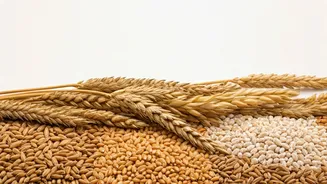What is Gluten?
Gluten, a protein found in wheat, barley, and rye, gives dough its elasticity, allowing it to rise. It's what makes bread chewy and holds baked goods together.
While gluten is a staple in many diets, it's not essential. For most people, consuming gluten doesn't cause any problems. However, for some, gluten can trigger significant health issues. Understanding gluten's basic role in food is the first step toward understanding how it might affect your body. Many food products contain gluten, including bread, pasta, cereals, and sauces. Recognizing this can help you better identify and avoid gluten if necessary.
Celiac Disease Unveiled
Celiac disease is a serious autoimmune disorder triggered by gluten ingestion. When someone with Celiac disease eats gluten, their immune system attacks the small intestine, damaging it and hindering nutrient absorption. This damage can lead to a range of symptoms, including digestive issues like bloating and diarrhea, as well as fatigue, skin rashes, and even neurological problems. Diagnosis typically involves blood tests and, often, a biopsy of the small intestine. The only treatment is a strict, lifelong gluten-free diet. Avoiding gluten is crucial to prevent long-term complications and maintain overall health. Celiac disease is a serious issue that demands attention.
Gluten Sensitivity Explained
Non-celiac gluten sensitivity (NCGS) involves experiencing symptoms similar to those of Celiac disease, but without the intestinal damage or positive blood tests associated with Celiac. People with NCGS may experience bloating, abdominal pain, fatigue, and brain fog after eating gluten. The exact mechanisms behind NCGS are still being researched, but it’s believed to involve an immune response to gluten. Unlike Celiac disease, NCGS doesn't cause damage to the small intestine. Management of NCGS usually involves reducing or eliminating gluten from the diet. The severity of symptoms can vary among individuals, making personalized dietary adjustments important.
When Does Gluten Trouble?
Gluten becomes a problem for those with Celiac disease and non-celiac gluten sensitivity. In Celiac disease, gluten intake triggers an autoimmune response, leading to intestinal damage and malabsorption. For individuals with NCGS, gluten can cause a range of symptoms, even without intestinal damage. Gluten can also cause problems for people with wheat allergies, an allergic reaction to proteins in wheat. Recognizing the difference between these conditions is critical for appropriate diagnosis and treatment. Seeking professional medical advice is essential if you suspect you might have an issue related to gluten. Your doctor will then guide you on how to best treat the symptoms.
Going Gluten-Free: Impact?
A gluten-free diet is essential for those with Celiac disease and often beneficial for people with NCGS. For people with Celiac disease, this diet is the only effective treatment, allowing the small intestine to heal. Many people also report feeling better when they remove gluten from their diet, even if they don’t have Celiac disease or NCGS. This can be due to reduced inflammation or an improved balance of gut bacteria. A gluten-free diet requires careful planning, as many processed foods contain hidden gluten. It is important to read labels carefully. This dietary change can improve a person's general well-being.
To Test or Not?
If you experience symptoms like bloating, fatigue, or digestive issues after eating foods with gluten, it may be time to get tested. If you suspect you have Celiac disease, your doctor will likely begin with blood tests to check for antibodies. A biopsy of the small intestine may be needed to confirm the diagnosis. For those with NCGS, there isn't a definitive test, and diagnosis often involves eliminating gluten and observing symptom improvement. Consulting a healthcare provider is essential for accurate diagnosis and personalized guidance. Always discuss your concerns with a doctor to get the right test.
Smart Eating Choices
Eating smarter, with or without gluten, involves making informed food choices. This means reading food labels carefully to identify hidden sources of gluten in products like sauces, processed foods, and even some medications. Focus on eating whole, unprocessed foods like fruits, vegetables, lean proteins, and gluten-free grains such as rice and quinoa. Choose naturally gluten-free foods as the foundation of your diet. Consider the nutritional value of what you eat. Always make informed choices when deciding what foods to consume.




















